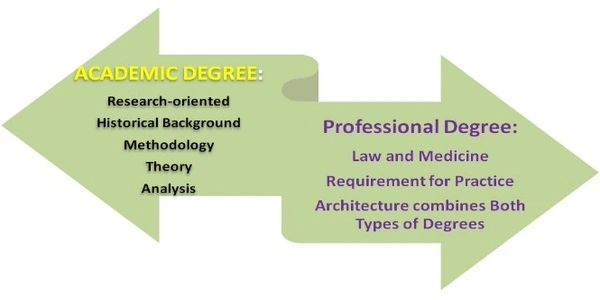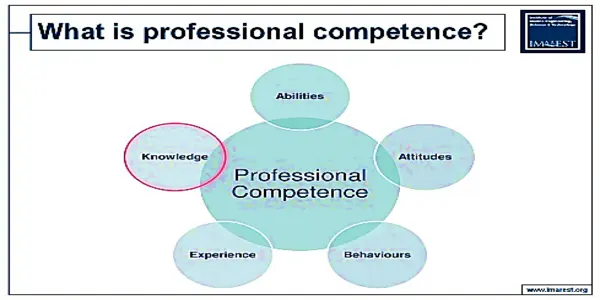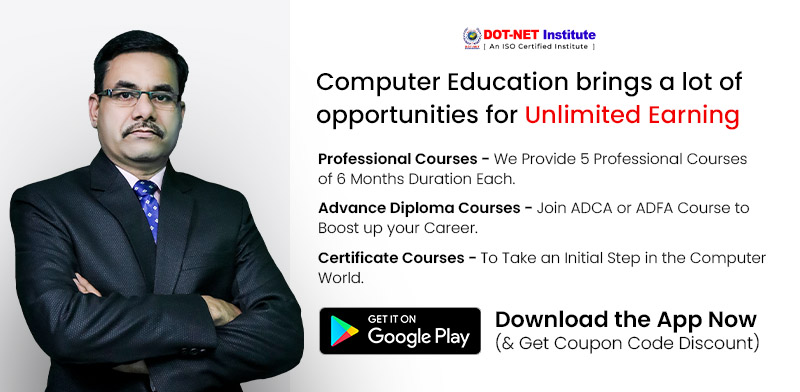In this ever-competitive world, you should always be looking for improvements in your area of expertise. It is important to take professional courses to improve your performance in a given career. Many people today go for these professional courses to get more advanced and better skills. It gives you basic knowledge as well as confidence.
Professional courses offer a variety of benefits, which is why enrolling in such courses is highly recommended. A professional course meets our constant need to upgrade our skills. It enables the candidate to identify his/her strengths as well as weaknesses. These vocational courses are often adjusted as per the requirement of the industry which benefits both fresh aspirants and working professionals.
Contents
What is Professional course?

- A vocational curriculum is a type of education that is modified according to the demands of a particular industry.
- Among other things, the emphasis of these courses is on skill development, professional advancement and self-improvement.
- These are specially made to meet the industry standards as well as meet the needs of individuals and employers.
- Qualifications for entry vary by industry. Many vocational course certificates are required for entry into a particular industry or profession.
- These courses can be part-time or full-time, and they can be long or short in duration. Professional courses provide a well-defined career path in the context of industry, such as medicine, engineering, management, law, mass media and hospitality, among others.
- Many students are choosing the road less traveled, that is, a professional school, because a bachelor’s degree offers limited scope in terms of salary and job opportunities.
Benefits of Professional course
1. Keeps you in form
When you do a professional course, you are not only exposed to new and innovative ideas, but it also keeps you updated with everything So, that is going on in your field of interest. You are constantly faced with the ongoing challenges in the market in order to create solutions for the same. It helps to keep you in form through continuous learning.
2. What sets you apart from others
In today’s competitive market, employers look for people who have a unique quality to offer their business? You get to develop new things and advanced concepts that give you the ability to approach challenges with a more strategic approach. You get to adopt a more creative and innovative approach towards solutions which will set you apart from others.
3. Ability to Contribute More
As you develop knowledge through continuous learning, you have much more to contribute to your organization than your counterparts who have not been a part of this professional development. Also, you are exposed to new ideas, perception and knowledge which gives you a competitive edge over others.
4. Enhances Your Creativity
Creativity is something that never stops developing but needs constant nurturing. Learning different ways of doing things and adapting to the ongoing trends is what boosts our creativity. You cannot stick to your old way of doing things. By constantly experimenting with different methods, you can improve and sharpen your creativity.
5. Business approach to customer demands
The business course teaches you the best way to attract and engage your customers. Through this you can meet the demands of your customers more effectively and in a more professional manner. This builds your customers’ trust in you and keeps them coming back for more.
Which option should you go for – Academic degree or Professional degree?

- Choosing a career is a major decision in life, and choosing a suitable college course can be an important step towards your dream career. Before deciding which course you should choose, do careful research and identify your goals.
- While for some careers, a professional degree is absolutely necessary, there are many other careers available after an academic degree. A professional degree trains you with the skills required for a job, but an academic degree helps develop your overall knowledge in a specific subject, widen your horizons, and groom your personality.
- If you are still in doubt as to what type of degree is best for you, try career counseling to help you make a well informed and suitable choice.
The Disadvantages of a Professional Degree
Although there are many benefits of a professional degree, there are also some disadvantages of earning a professional degree.
1. Competition is Normally High
One of the main disadvantages of pursuing a professional degree is the level of competition that exists in the market. Particularly in fields such as engineering and medicine, students begin preparing years in advance or even drop years to focus on studying, resulting in intense competition.
2. Not all institutions provide quality education
The popularity of professional degrees has resulted in an increase in the number of colleges and institutions, many providing substandard quality of education and training, reducing the job opportunities available after the course. As technology is advancing at a rapid pace, it is important that the institute is up-to-date and provides you with relevant knowledge and skills. Therefore, it is essential to thoroughly verify the affiliation, affiliation and placement record of the college or institution you are considering.
Also check:
-
5 Best Computer Course in India for Private Job (India में प्राइवेट नौकरी के लिए 05 BEST कंप्यूटर कोर्स)
-
Google jobs in India | Google में चाहिए नौकरी तो कर ये 5 कोर्स - मिलेगा लाखों का पैकेज | Google Jobs
-
Retail Management Career | Retail Jobs | How to get Retail Management Job
-
How to Start Earning as a Graphic Designer?
-
Paramedical Courses | Paramedical Career | कम बजटऔर कम फीस में मेडिकल करियर बनेगा
3. May Not Build a Solid Academic Foundation
The fact that professional degrees are so specialized can also serve as a disadvantage? Because you won’t have a normal academic base to fall back on, it will be more difficult to change careers later in life if you’ve studied a professional degree.
4. Distance learning option
In a time when distance learning and correspondence education have become common, allowing you to work while you learn, professional degrees and courses are usually only full-time, requiring a huge time commitment Is.
How we can choose the Right Professional Course for Career Growth?
The career process starts from primary education and continues till retirement. Individuals need to be smart in the field of education and skills to thrive in the competitive environment. However, with the world undergoing a paradigm shift in terms of education, technology and socialization, it is important to choose a career that retains its value in the long run.
There are also a plethora of online course options available through online educational platforms, but this leaves the learners perplexed as to how to choose a professional course for career growth and development. The role of a professional course is not only to enhance career growth but also to find work purpose, explore new roles and gain networking opportunities. There are certain steps that need to be followed while selecting a suitable course for professional development.
Factors to Consider While Choosing a Professional Course
1. Consider Your Interests
A curriculum should strengthen an individual’s academic skills, as well as broaden their skill set to include skills in demand. The first step in selecting a professional course is to decide on the subject of interest to the learner. This decision is important because you can invest time and money in the learning process. The idea is to research and choose a topic that has market value and is recognized by organizations.
2. Review course content
Course content is an essential aspect to consider before enrollment as it can affect overall learning outcomes. The curriculum should take the learner from beginner to expert level by clarifying the importance of each topic for professional development. For upskilling, the curriculum should address current issues and also prepare the learner for the desired job or position in the future. In addition, the content should be tailored to the individual’s goal and purpose.
3. Career options available for professional development
Soft skills are essential to enter any organization. In order to express and be understood quite effectively, a person must be able to communicate effectively. Furthermore, some organizations require skilled talent who are fluent in a foreign language. As a result, having advanced certification in the most in-demand languages can help individuals pursue lucrative careers. In addition, employees need management and leadership training to develop managerial qualities and effectiveness.
4. All things considered
Choosing the ideal professional path is undoubtedly challenging. However, all it takes is persistence and an open mind while looking for career growth options. In this way, if you have a well-defined professional objective, your chances of finding the right path for career development will increase. The three key elements that help set you on a successful and rewarding career path are hard work, planning and self-reflection. Thanks to the educational forums that provide proper guidance and advice to the students and help they choose the right professional courses for massive career growth.
What are some examples of professional competence?

- Computer Science Courses – If you are interested in pursuing a career in computer science, consider getting a Bachelor of Computer Application (BCA) or Master of Computer Application (MCA).
- Education courses – A Bachelor of Education (B.Ed.) or Master of Education (M.Ed.) are often the professional qualifications required to work as a teacher.
- Fine Arts Courses – If you enjoy being creative, consider earning a Diploma in Fine Arts, Bachelor of Fine Arts (BFA) or Master of Fine Arts (MFA).
- Engineering Courses- For an engineering career, it is generally necessary to complete Bachelor of Engineering (B.E), Master of Engineering (M.E), Bachelor of Technology (B. Tech.) or Master of Technology (M.Tech). Program.
- Architecture Course – Get Bachelor of Architecture (B.Arch.) or Master of Architecture (M.Arch.) degree to work in architecture field.
- Management Courses – You can complete Bachelor of Business Administration (BBA) or Master of Business Administration (MBA) to work in the management field.
- Finance courses – To work in the financial sector, pursuing Bachelor of Commerce (B.Com), Master of Commerce (M.Com) can be helpful.
- Dental Courses – To become a dentist, you need to complete Bachelor of Dental Surgery (BDS) or Master of Dental Surgery (MDS) degree program.
- Pharmacy Courses – Pharmacy professionals must have a Bachelor of Pharmacy (B.Pharma) or Master of Pharmacy (M.Pharma) degree.
Why do you need professional qualifications?
- You may need a professional qualification for these reasons:
- Working in medicine, management, engineering, law, and other fields is a legal requirement.
- This can help you gain professional recognition in your field.
- Professional qualifications enable you to gain membership from professional bodies or organizations.
- It can guide you to participate in continuing professional development and update your skills, qualifications and knowledge.
- A professional qualification can show employers that you have specialist knowledge for a position, which can open up more work opportunities for you.
Conclusion
- In conclusion, it can be said that both regular as well as vocational courses have their own advantages and disadvantages. So, students are advised to think and analyze well before choosing course for themselves. If a student cannot afford the high fees of professional course then he/she should go for regular course. But if a student wants to achieve sky high success then he should do professional course.
- For further inquiries and related information, you may contact the professional experts of DOT-NET Institute. Hope this will help you!
FAQs
A professional course is one that provides you with practical skills, making you job ready upon completion of the course. In comparison, a degree course aims to give you a strong academic base in a particular subject, not necessarily make you ‘job ready’.
Bachelor of IT is an undergraduate academic degree awarded after the completion of the course.
- Consider your current experience and skill set.
- Consider possible careers and employment opportunities.
- Think about what topics interest you.
- Talk to your employer, coworkers, or peers about which courses are relevant and can enhance your career.
A professional degree helps prepare students for careers in specialized fields such as law, pharmacy, medicine, and education. The duration of the programs varies and can be anywhere from one to five years, depending on which institution you attend.
A professional degree is an advanced education designed to prepare you for work in a specific field, such as medicine or law. Similar to advanced academic degrees, such as doctorates and some master’s degrees, professional degrees are considered terminal degrees—or the highest degree you can obtain in a field.
- Helps you develop and sharpen skills:
- Without the required skills, it is difficult for a candidate to survive in the practical world. Vocational courses sharpen the skills of the students. Once he has a professional certification, it becomes easier to adapt to the challenges of the workplace.
Professional degrees usually take longer to complete than academic degrees. Professional degrees may have additional qualifying criteria such as bar exams, licensure tests and apprenticeship programs attached. A professional graduate degree is not the same as a graduate degree.
- A professional job is a career which requires a specific amount of advanced training and education.
- Some examples of professional jobs include:
- doctor
- Teacher
- The lawyer.
- The artist.
- The author.
- scientists


